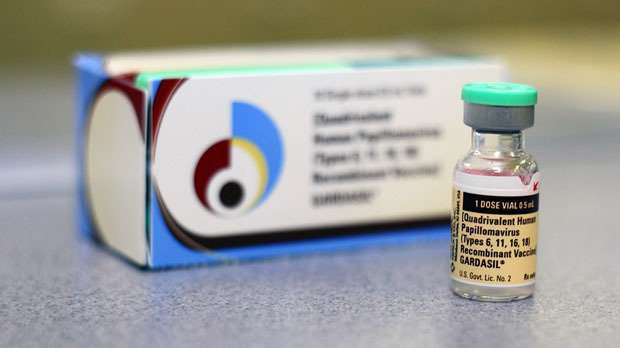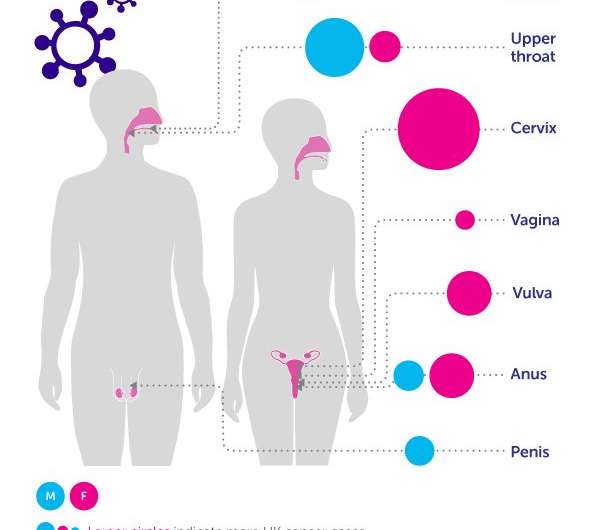Boys should be given HPV jab, says vaccine committee

It's nearly a decade since the human papillomavirus (HPV) vaccine was first introduced in the UK to help protect against the virus that causes most cases of cervical cancer. But until now, it has only been routinely offered to girls.
Today, the Joint Committee for Vaccination and Immunisation (JCVI) recommended that adolescent boys should now also receive the vaccine.
When and how this will happen is now down to the Government. But the recommendation comes from years of mounting evidence around likely health benefits and overall cost effectiveness.
HPV and cancer
HPV is a big family of viruses. There are more than 100 different types and some are more dangerous than others. While some low risk types cause growths like warts or verrucas, there are thirteen high-risk types that are linked to cancer.
HPV is very common, with 8 in 10 people infected at some p oint in their life. Usually our bodies clear the infection without it causing any problems. But in some cases a lasting infection can lead to cancer.
This is because the virus damages the infected cells' DNA and causes them to start dividing out of control, setting them on the road to cancer.
Thanks to the vaccination programme, many people know that HPV causes cervical cancer – in fact it's linked to all cases of the disease in the UK. But HPV is linked to other cancers too – including anal, penis and some types of mouth and throat cancer.
Why wasn't the HPV vaccine always available for boys?
The HPV vaccine protects against 4 types of HPV. Two are linked to cancer: HPV 16 and 18, which together cause around 7 in 10 cervical cancer cases in the UK. The vaccine also protects against HPV 6 and 11, which cause most genital warts.
The vaccine has been available to girls in the UK since 2008. It was initially only recommended for girls as the strongest evidence of health benefits and cost effectiveness was for cervical cancer and genital warts.
Since the vaccine was introduced, we're starting to see HPV infections in people who have been vaccinated falling. This suggests the vaccine is preventing HPV infection and, in the future, this should prevent cervical cancers.
But HPV is linked to cancers in men as well as women.

Men who have sex with women will get some protection from the current vaccination programme if their partner is vaccinated. The same can't be said for adult men who have sex with men .
In 2015, the JCVI, which advises UK health departments on vaccines, recommended extending vaccination to adult men who have sex with men. This group of men are at a higher risk of anal cancer. Up to the age of 45, these men can request HPV vaccination at sexual health clinics.
But up until today, the programme hadn't been recommended for boys, as the JCVI weren't convinced it would be cost-effective.
Today's decision brings the UK in line with other countries including the US and Australia, which already offer the vaccination to boys.
Who will be offered the vaccine?
The JCVI has recommended the vaccine for boys aged 11-13, similar to the vaccination programme for girls. HPV vaccination is most effective in people who haven't ever had an HPV infection. And as HPV is mostly transmitted through close sexual contact, vaccination is offered at a young age when people are unlikely to have had any sexual experiences.
Men above the vaccination age who don't have sex with men won't be offered the vaccine. But it's important to remember that most people clear HPV infections without them causing any symptoms or problems. And for most cancers linked to HPV there are also other ways to reduce your risk through things like not smoking or drinking less alcohol.
What happens now?
The recommendation for a gender neutral vaccination programme for adolescents has been years in the making. The next step is for the Government to formally accept the recommendation and extend the programme to boys.
Until it does, we won't know the details of when and how the programme will be rolled out. Once they have accepted the recommendation, the Government must publish a plan and timetable for the roll-out.
This will need to be accompanied by more details on the programme itself. When the vaccine was first offered to girls in the UK, a 'catch-up' programme was introduced for girls up to the age of 18, and we want the Government to do the same for boys.
Finally, the programme will do nothing if people aren't aware it's happening. We want to see a national awareness campaign to clearly communicate about the vaccine and its potential benefits, as well as new information for parents and boys.
By offering the vaccine to everyone aged 11-13, the number of cases of HPV, along with the cancers they cause, could be dramatically reduced in the future.

















